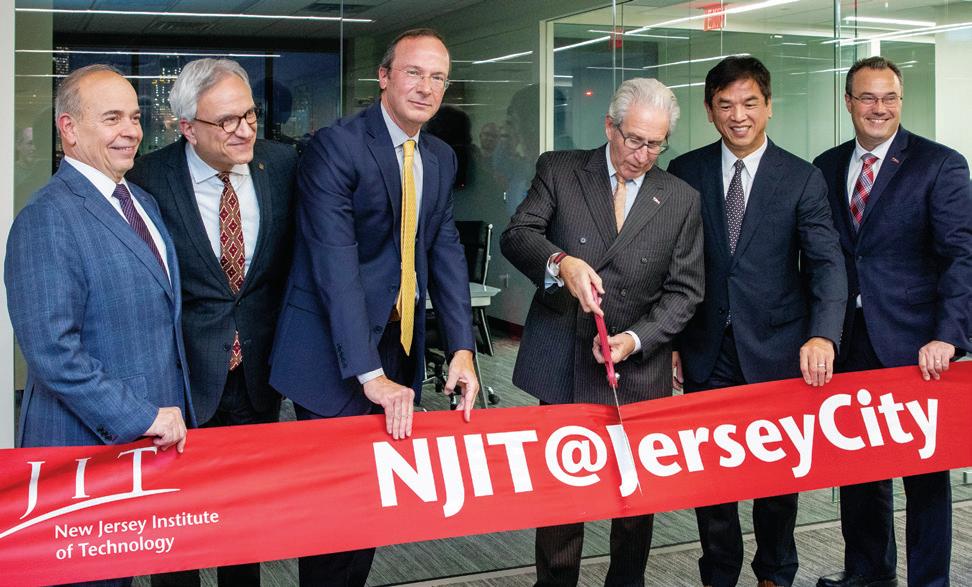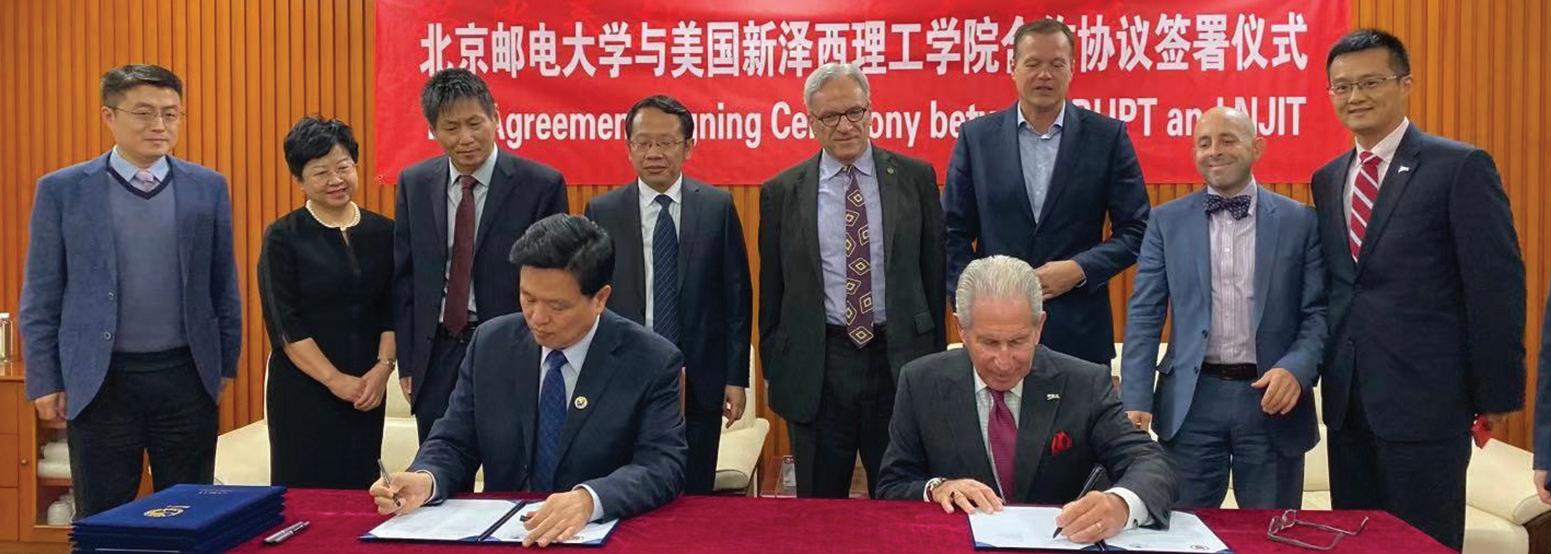
7 minute read
Leading into the Future: Education
EDUCATION
NJIT@JerseyCity Officially Launched with Expectation of Rapid Growth
(From left): Edward J. Bishof, Sr., senior vice president for finance and chief financial officer; Fadi P. Deek ’85, ’86, ’97, provost and senior executive vice president, NJIT; Craig Gotsman, dean of Ying Wu College of Computing, NJIT; Joel S. Bloom, president, NJIT; Jordan Hu ’89, founder/ chief executive officer, RiskVal Financial Solutions, LLC and member of the NJIT Board of Trustees; and Andrew P. Christ P.E. ’94, ’01, senior vice president for real estate development and capital operations, NJIT.
NJIT welcomed 35 data science students to its newly opened NJIT@ JerseyCity location in the fall semester, with a goal of doubling that number in the spring and reaching 500 students in three years, Ying Wu College of Computing Dean Craig Gotsman said at the ribboncutting ceremony held December 5 at the new location.
Gotsman said the current students are primarily working professionals in the finance and tech industries from companies located in Jersey City and also in New York City. Hudson County quickly became a technology hub following the September11 attacks and was bolstered again after Hurricane Sandy.
NJIT@JerseyCity currently offers a master’s degree in data science, as well as graduate certificates in big data and data mining, with plans to add a graduate certificate in data visualization in spring 2020. Non-credit data science accelerator programs are also expected to be offered in the spring. All current students are studying part-time, but Gotsman envisions the location will soon have options for full-time students. Future plans also include graduate programs in cybersecurity. n

NJIT Signs Three Agreements to Collaborate with Chinese University
Beijing University of Posts and Telecommunications (BUPT) and NJIT are now partners in education. The institutions signed a memorandum of understanding (MOU), as well as two other agreements involving NJIT’s Martin Tuchman School of Management (MTSM), October 25 in Beijing. Joel S. Bloom, NJIT president, and Jianyong Qiao, BUPT president, represented their respective universities, along with faculty and staff, at the signing.
The MOU, effective for five years from the signing date, covers multiple areas for potential collaboration between NJIT and BUPT. These include research partnerships, summer and study abroad programs and the exchange of students, faculty, scholars, staff, and teaching and academic materials and publications.
The first agreement with MTSM provides a path for master’s students in BUPT’s School of Economics and Management to earn degrees from both BUPT and NJIT. A 1+1 program will enable students to come to NJIT for a year after one year of study at BUPT and, after completing the required curriculum, receive an M.S. in management from each university. Students can qualify for an M.S. from BUPT and an MBA from NJIT with one year of study at BUPT and one and a half years at NJIT.
Under the second MTSM agreement, BUPT students (primarily undergraduates) will have the opportunity to take part in a 10- to 15-day program at NJIT offering IBM Blockchain training and visits to businesses in the New York/New Jersey area. These two programs are expected to help boost enrollment and promote both NJIT and the MTSM in China, the largest source of international students in the U.S. n

NJIT, Ocean County College Expand and Renew Transfer Agreement
Anew two-year agreement between Ocean County College and New Jersey Institute of Technology allows OCC graduates to transfer directly into NJIT colleges. The agreement went into effect on October 4, 2019 and covers NJIT’s College of Science and Liberal Arts, Newark College of Engineering, Martin Tuchman School of Management, and Ying Wu College of Computing.
To be admitted to NJIT, students from Ocean County College must be in good standing and have a minimum cumulative grade point average of 2.5. Students transferring into the computing college are required to have a minimum GPA of 2.8.
Administrators at both NJIT and Ocean County College said they expect students to complete their bachelor’s degree requirements within two and a half years of starting full-time study at NJIT. NJIT and OCC previously worked together, in 2016, to admit transfer students for selected majors. n


NJIT, UCC Launch Joint Academic Agreement
Union County College (UCC) students pursuing an associate degree in either science or applied sciences are now able to seamlessly transfer into a variety of bachelor’s degree programs at NJIT.
The two institutions signed a two-year academic agreement April 30, 2019, to provide UCC students with the opportunity to plan their total baccalaureate experience at the beginning of their college education. The agreement also serves to facilitate the recruitment of students into programs offered by both NJIT and UCC. n
J. Robert and Barbara A. Hillier College of Architecture and Design Launched with Historic Gift
NJIT Unveils New Jersey’s First Cyberpsychology Program
NJIT has renamed its College of Architecture and Design for J. Robert and Barbara A. Hillier to reflect the globally renowned architects’ historic donation to the university. Their gift, the university’s largest ever, will enrich the architecture and design program in many ways: with scholarships that diversify the pool of talented architects entering the profession and funds for the technology that will advance it, to name just two.
The Hilliers, Princeton-based architects who built one of the country’s most comprehensive and successful practices with a mix of design skill, niche savvy, marketing acumen and old-fashioned attention to their clients’ needs, say it was NJIT’s technologyenhanced focus on the future that inspired their philanthropy.
In addition to their strong Princeton ties — Barbara Hillier also has a master’s degree from Princeton University and their former firm designed several buildings on that campus — the Hilliers have a longstanding connection with NJIT. For one, their firm designed all three versions of the School of Architecture, which was established in 1974. Later, the firm renovated another space to accommodate the rapidly expanding program, and then in the late 1990s, designed the modernist Weston Hall, the home of the school today. Both Robert Hillier and his father James, chief scientist at RCA and the developer of the first operating electron microscope in the world, have received honorary degrees from NJIT. Robert served as the first chairman of the Albert Dorman Honors College Board of Visitors and endowed a scholarship in honor of his first daughter, who died in a car crash in 1984.
Having watched NJIT and the city of Newark evolve over the past several decades, the Hilliers are enthusiastic about both. They look to architects trained at the university to play a role in shaping what they call a “Renaissance City,” while making key, life-improving connections for the people who live there now. n

NJIT’s College of Science and Liberal Arts now offers students a unique baccalaureate degree option in the emerging field of cyberpsychology. The new program — exploring the dynamics between modern technology and human psychology — is the first of its kind in New Jersey, and is the first academic program in the behavioral sciences to be offered at NJIT.
The 120-credit degree program, now available for enrollment through the college’s Science, Technology and Society B.S. degree program, involves a combination of traditional coursework in psychology, and study of basic concepts in computer science and information systems. The program also features specialized cyberpsychology course electives that address modern psychological issues of today’s technology-driven world, ranging from the psychology of social networking and online gaming to issues of cybercrime and cyberbullying.
Along with preparation for graduate studies in the cognitive sciences, the program promises to offer aspiring psychologists in-depth study of topics such as “the significance of living a predominantly online life for our social lives, the psychological impact of the internet of things, therapeutic uses of technology, tools for countering malicious social engineering and other cybersecurity issues, gaming and its impact, and digital and electronic research methods.”
The new option also is geared toward students training in a range of growing career fields with increasing demand for expertise in human-computer interaction — from cybersecurity and law enforcement professionals, to app and game developers, to computer and information research scientists, to marketing research analysts. n






